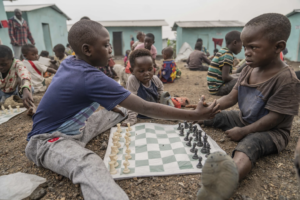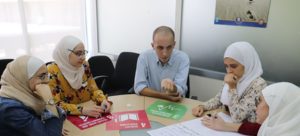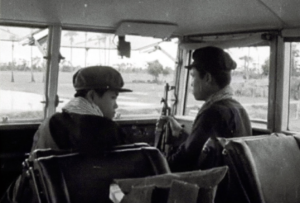With the bright, blooming greens of springtime juxtaposed against a sea of red shirts and dresses, and tribal flags blowing in the breeze above them, hundreds of Indigenous citizens marched through the city Friday to amplify the nation’s epidemic of missing, murdered and Indigenous people (MMIP).
“Violence against Indigenous people is an epidemic. And we will not be silent, we will not stop, and we will demand that you work with us to stop it so that every person can live free from violence,” said Nottawaseppi Huron Band of the Potawatomi Chief Judge Melissa L. Pope.
The second annual March for MMIP drew a large crowd in Ah-Nab-Awen (“Resting Place”) Park, amid mounds of earth meant to commemorate Native burial mounds that were looted and destroyed by settlers in the mid-1800s.
The solemn, peaceful gathering for missing and murdered Indigenous relatives was marked by a flag procession, song and dance, ceremony and prayer amid speeches from leaders, advocates and officials.
Speakers included tribal chairpersons, including Ron Yob for the Grand River Bands of Ottawa Indians, Rebecca Richards for the Pokagon Band of Potawatomi Bob Peters for the Match-e-be-nash-she-wish Band of Pottawatomi Indians of Michigan and Jamie Stuck for the Nottawaseppi Huron Band of the Potawatomi.
U.S. Attorney for the Western District of Michigan Mark Totten; Melissa Kiesewetter, tribal liaison and Native American specialist with the Michigan Department of Civil Rights; and Rachel Carr-Shunk of Uniting Three Fires Against Violence, a tribal victim advocacy group based in Sault Ste. Marie also spoke at the event.
“A lot of times in Indian Country or if you’re an Indigenous person, you often feel invisible,” Carr-Shunk told the Advance. “Our stories are not covered.”
She said that not only are most non-Native Michiganders oblivious to the epidemic of missing and murdered Indigenous people, but she feels that many settlers are not even aware that there are 12 tribes in Michigan — let alone their rich culture, traditions and history.
Raising awareness is a first step to solving the underlying, complex problems that have plagued Indigenous communities for so long, Carr-Shunk said.
In the United States, Native women are 10 times more likely to be murdered than all other ethnicities. Other instances of violence also occur at disproportionately higher rates for Indigenous people; and as a result of complicating factors, solving cases involving crimes against Native people happens at a far lower rate, Carr-Shunk noted.
“Because of things beyond our control [like] Supreme Court decisions, laws and policies, tribes are left with their hands tied to provide safety and justice in our own communities … in a way that is reflective of our culture and our identity,” Carr-Shunk said.
She said that with the new Democratic-led state Legislature, she hopes that lawmakers will move swiftly to change this. Carr-Shunk pointed to House Bill 4516, sponsored by state Rep. Betsy Coffia (D-Traverse City), as an example. The bill would formally expand domestic violence resources to tribal service providers, who right now are not eligible to receive the crucial victim services funding.
After the crowd of tribal elders, Indigenous advocates and allies made the slow, deliberate procession across bridges and streets in central Grand Rapids, more speakers echoed the need for non-Native people, entities and governments to help amplify the cause.

SUPPORT NEWS YOU TRUST.
Kiesewetter read aloud Gov. Gretchen Whitmer’s proclamation declaring May 5, 2023, as Murdered and Missing Indigenous Persons Awareness Day. President Joe Biden similarly issued a lengthy proclamation on Thursday doing the same.
“As many as 85% of Indigenous Two Spirit individuals who fulfill one of many mixed gender roles traditionally found in many Indigenous groups have been a victim of violence,” Kiesewetter read from Whitmer’s proclamation.
Advocates also had a message for the media: “You need to take notice when people of color are murdered and are missing,” said Stuck, who chairs the Nottawaseppi Huron Band of the Potawatomi.
“If you don’t know, there’s no shame in it. But it’s our responsibility to learn,” said Melissa Isaac, a citizen of the Saginaw Chippewa Indian Tribe.
“We are also not our pain stories. That does not define who we are. That is evident today.”
This story was first published by the Michigan Advance, part of the States Newsroom network of news bureaus. It’s supported by grants and a coalition of donors as a 501c(3) public charity. Michigan Advance maintains editorial independence. Contact Editor Susan Demas for questions: info@michiganadvance.com. Follow Michigan Advance on Facebook and Twitter.




